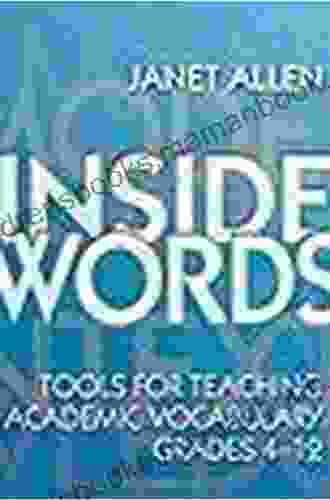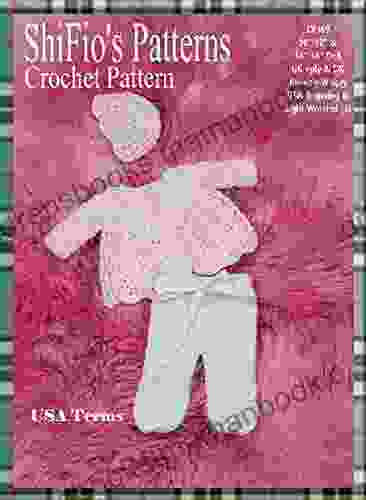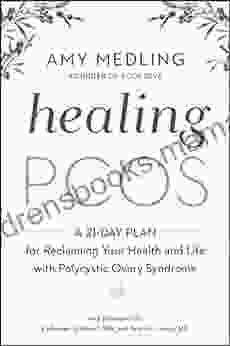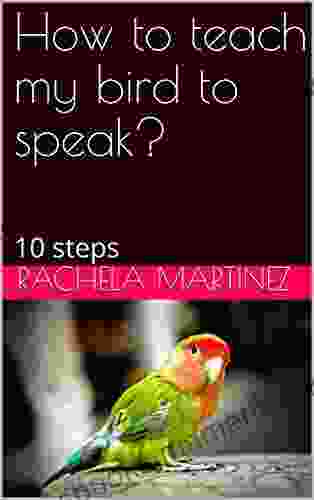Words Words Words: Teaching Vocabulary In Grades 1-2

Vocabulary is a critical component of literacy development. It is the foundation for comprehension, writing, and oral language skills. A strong vocabulary helps students to understand what they read and hear, and to express themselves clearly and effectively.
In grades 1 and 2, students are beginning to develop their vocabulary skills. They are learning new words every day, and they are starting to use them in their own speech and writing. Teachers can help students to build their vocabulary by providing them with explicit instruction, engaging activities, and plenty of opportunities to practice using new words.
Explicit vocabulary instruction is a type of instruction that directly teaches students new words. This can be done through a variety of methods, such as:
4.5 out of 5
| Language | : | English |
| File size | : | 4616 KB |
| Text-to-Speech | : | Enabled |
| Screen Reader | : | Supported |
| Enhanced typesetting | : | Enabled |
| Word Wise | : | Enabled |
| Print length | : | 160 pages |
| Lending | : | Enabled |
- Word walls: A word wall is a display of words that students are learning. The words can be organized by topic, difficulty, or any other criteria that the teacher chooses. Students can refer to the word wall throughout the day to help them remember new words.
- Vocabulary notebooks: Vocabulary notebooks are a place for students to record new words and their definitions. Students can also use their notebooks to practice writing and using new words.
- Direct instruction: Direct instruction is a type of instruction in which the teacher explicitly teaches students new words. This can be done through a variety of methods, such as:
- Definition: The teacher provides students with the definition of a new word.
- Context: The teacher provides students with a sentence or passage that uses the new word in context.
- Visuals: The teacher provides students with a picture or diagram that represents the new word.
In addition to explicit instruction, teachers can also use a variety of engaging activities to help students learn new words. These activities can help to make vocabulary instruction more fun and memorable. Some engaging vocabulary activities include:
- Word games: Word games are a fun way for students to practice using new words. There are a variety of word games that can be used in the classroom, such as:
- Word Bingo: Students listen to the teacher say a word and then mark off the word on their Bingo card if they have it.
- Charades: Students take turns acting out a word while their classmates try to guess what it is.
- Pictionary: Students take turns drawing a word on a whiteboard or paper while their classmates try to guess what it is.
- Vocabulary charades:** Vocabulary charades is a variation of the traditional game of charades. In this game, students take turns acting out a word that is related to a specific topic or theme.
- Vocabulary skits: Vocabulary skits are a fun way for students to practice using new words in a creative way. Students can create their own skits or use scripts that are provided by the teacher.
- Vocabulary songs: Vocabulary songs are a great way for students to learn new words while having fun. There are a variety of vocabulary songs that can be found online or in music education books.
In addition to explicit instruction and engaging activities, teachers can also provide students with plenty of opportunities to practice using new words. This can be done through a variety of activities, such as:
- Reading aloud:** Reading aloud to students is a great way to expose them to new words. When you read aloud, be sure to pause and explain any words that students may not know.
- Independent reading: Independent reading allows students to practice using new words in a meaningful context. Encourage students to read a variety of texts, such as books, magazines, and newspapers.
- Writing: Writing is a great way for students to practice using new words in their own writing. Encourage students to write about their experiences, thoughts, and ideas.
- Speaking: Speaking is another great way for students to practice using new words. Encourage students to participate in class discussions and to share their ideas with their classmates.
Vocabulary instruction is a critical component of literacy development. By providing students with explicit instruction, engaging activities, and plenty of opportunities to practice, teachers can help students to build their vocabulary and become more successful readers and writers.
4.5 out of 5
| Language | : | English |
| File size | : | 4616 KB |
| Text-to-Speech | : | Enabled |
| Screen Reader | : | Supported |
| Enhanced typesetting | : | Enabled |
| Word Wise | : | Enabled |
| Print length | : | 160 pages |
| Lending | : | Enabled |
Do you want to contribute by writing guest posts on this blog?
Please contact us and send us a resume of previous articles that you have written.
 Top Book
Top Book Novel
Novel Fiction
Fiction Nonfiction
Nonfiction Literature
Literature Paperback
Paperback Hardcover
Hardcover E-book
E-book Audiobook
Audiobook Bestseller
Bestseller Classic
Classic Mystery
Mystery Thriller
Thriller Romance
Romance Fantasy
Fantasy Science Fiction
Science Fiction Biography
Biography Memoir
Memoir Autobiography
Autobiography Poetry
Poetry Drama
Drama Historical Fiction
Historical Fiction Self-help
Self-help Young Adult
Young Adult Childrens Books
Childrens Books Graphic Novel
Graphic Novel Anthology
Anthology Series
Series Encyclopedia
Encyclopedia Reference
Reference Guidebook
Guidebook Textbook
Textbook Workbook
Workbook Journal
Journal Diary
Diary Manuscript
Manuscript Folio
Folio Pulp Fiction
Pulp Fiction Short Stories
Short Stories Fairy Tales
Fairy Tales Fables
Fables Mythology
Mythology Philosophy
Philosophy Religion
Religion Spirituality
Spirituality Essays
Essays Critique
Critique Commentary
Commentary Glossary
Glossary Bibliography
Bibliography Index
Index Table of Contents
Table of Contents Preface
Preface Introduction
Introduction Foreword
Foreword Afterword
Afterword Appendices
Appendices Annotations
Annotations Footnotes
Footnotes Epilogue
Epilogue Prologue
Prologue Joel Best
Joel Best Dayna Lorentz
Dayna Lorentz Bob Sorge
Bob Sorge S L Turner
S L Turner J Larry Jameson
J Larry Jameson Broderick Johnson
Broderick Johnson Joan Lee
Joan Lee Walker Dryden
Walker Dryden Caitlyn Siehl
Caitlyn Siehl Jeanne Larsen
Jeanne Larsen Dorothy Livesay
Dorothy Livesay Alison Weir
Alison Weir James Mcgrath Morris
James Mcgrath Morris Brian Doyle
Brian Doyle Mike Berenstain
Mike Berenstain Wendy Van Camp
Wendy Van Camp Edoardo Nesi
Edoardo Nesi John Zheng
John Zheng Sue Lyndon
Sue Lyndon Arivan Srinivasan
Arivan Srinivasan
Light bulbAdvertise smarter! Our strategic ad space ensures maximum exposure. Reserve your spot today!
 Diego BlairFollow ·15k
Diego BlairFollow ·15k Duane KellyFollow ·11.7k
Duane KellyFollow ·11.7k Nick TurnerFollow ·6.8k
Nick TurnerFollow ·6.8k James HayesFollow ·18.6k
James HayesFollow ·18.6k Terry BellFollow ·8.4k
Terry BellFollow ·8.4k Wayne CarterFollow ·8k
Wayne CarterFollow ·8k Derek BellFollow ·2.8k
Derek BellFollow ·2.8k Andy HayesFollow ·6k
Andy HayesFollow ·6k

 Tom Clancy
Tom ClancyReading Wellness: Lessons in Independence and Proficiency
Reading is a fundamental skill that can...

 Brody Powell
Brody PowellHow Global Currencies Work: A Comprehensive Guide to...
Overview of...

 Dwight Bell
Dwight BellDune by Frank Herbert: An Epic Space Opera That Explores...
Dune by Frank...
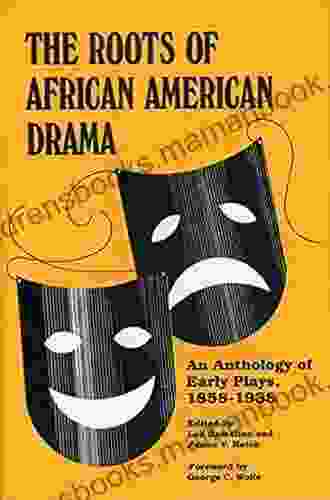
 Ronald Simmons
Ronald SimmonsAn Anthology of Early Plays (1858-1938): A Journey into...
: Uncovering...

 Dominic Simmons
Dominic SimmonsCulture in the Ancient World: A Comprehensive Exploration...
Culture is a complex and multifaceted concept...
4.5 out of 5
| Language | : | English |
| File size | : | 4616 KB |
| Text-to-Speech | : | Enabled |
| Screen Reader | : | Supported |
| Enhanced typesetting | : | Enabled |
| Word Wise | : | Enabled |
| Print length | : | 160 pages |
| Lending | : | Enabled |


